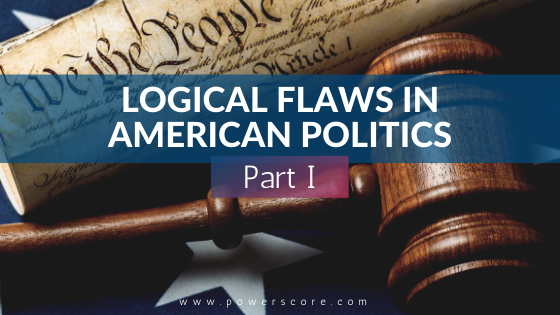If you’re preparing for the LSAT, you’re probably familiar with the sorts of flaws that commonly appear on the Logical Reasoning sections of the test. If not, there is an entire chapter devoted to Flaw in the Reasoning questions in the PowerScore LSAT Logical Reasoning Bible. Your chances of running into a flaw question on the test is very high. Political debating season provides countless examples, as well.
Source Argument
- “Look at that face. Would anyone vote for that?” – Donald Trump
In the quote above, Trump has made a Source Argument. This attack is clearly personal against candidate Carly Fiorina, rather than any particular argument from Fiorina. This argument, aka an ad hominem attack, is directed at the source of the argument rather than the arguments advanced.
When you encounter this kind of reasoning on the test, look for answer choices such as:
- “The attack is directed against the person making the argument rather than directing it against the argument itself.”
- “It draws conclusions about the validity of a position from evidence about a position’s source.”
False Dilemma
- “There really are only two alternatives here. Either the issue of Iran obtaining a nuclear weapon is resolved diplomatically through a negotiation or it’s resolved through force, through war. Those are—those are the options.” – Barak Obama
When discussing options for dealing with Iran, Obama assumes there are only two courses of action. This is in spite of the fact that other options may be available. Coercive diplomacy, for example, provides something of a middle ground. This is when diplomacy continues with additional signals of determination in an effort to pressure the other side into making concessions. This type of argument is a False Dilemma.
When you see similar logic on the LSAT, look for the answer choice that provides a description such as:
- “The author provides only two options from which to choose, without considering the possibility that a third option may also exist.”
Lack of Evidence
- “Not one of the 17 GOP candidates has discussed how they’d address the rising cost of college. Disappointing, but not surprising.” – Hillary Clinton
This quote exemplifies a General Lack of Evidence for the Conclusion. As it turns out, the problem of rising college costs is a major part of Marco Rubio’s platform. Additionally, Chris Cristie, Carly Fiorina, Rand Paul and Jeb Bush have all discussed the issue.
The type of flaw is when an author or speaker attempts to prove a claim, yet provides no evidence that justifies the speaker’s conclusion. When you recognize this error in the stimulus and the follow up question is a Flaw, look for a description within the correct answer choice such as:
- “The author draws a conclusion that is not warranted by the evidence provided.”
- “Uses inapplicable information to draw a conclusion.”
Causation and Correlation
- “I’d like to you take the camera off me and put it on the audience because I’d like to ask all of you, how many of you, raise your hand, believe that in today’s Barak Obama America your children will have a better life than you’ve had.” – Chris Christie
In this example, Christie is Basing a Causal Conclusion on a Correlation. He is suggesting that the audience attribute any issues they have with the current state of the country to Obama. Obama is the president, of course, and as such does have quite a bit of power. But, certainly not enough to justify placing the blame on him for every one of the country’s problems.
LSAT authors often make this error, providing evidence that two events are correlated. They then conclude without justification that one must have caused the other. When you see this type of error in a logical reasoning stimulus, the right answer will provide a description such as:
- “Confusing the coincidence of two events with a causal relation between the two.”
- “Assumes a causal relationship where only a correlation has been shown.”
Straw Man Argument
- “…if you vote for Hillary, you are voting for the Ayatollah Khomeini to possess a nuclear weapon and if you elect me as president, under no circumstances will a theocratic ayatollah who chants death to America ever be allowed to acquire a nuclear weapon.” – Marco Rubio
This is an example of a Straw Man argument. Straw Man Arguments describe the logically flawed strategy of distorting an opponent’s position in order to make it easier to attack or refute. When you see this in a stimulus and the follow up is a Flaw question, look for the answer choice that provides a description such as:
- “Refutes a distorted view of an opposing position.”
- “Mischaracterizes the opposing position, thus making it easier to challenge.”
It’s valuable to recognize and understand these flaws, so that when you encounter them on the LSAT you can quickly identify them, and to be familiar with how such flaws are generally characterized in the correct answer choices. For more practice with Flaw in the Reasoning questions, as well as all other types of Logical Reasoning questions, check out our Testing and Analytics Package. We include drills to help focus on specific concepts and question types on the LSAT.



Leave a Reply